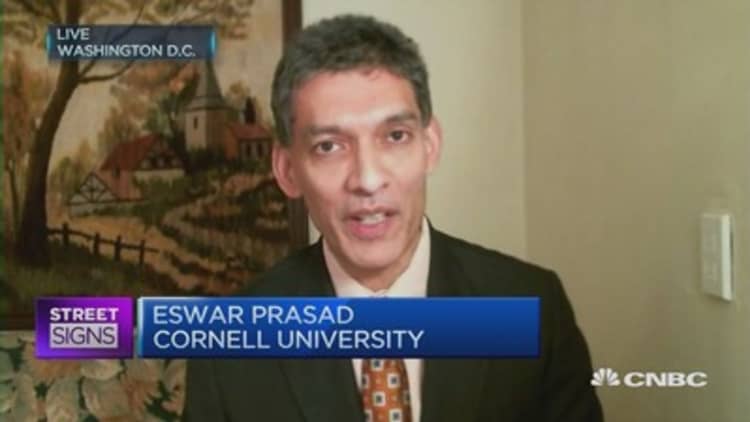
China faces pressure to impose capital controls to stave off large-scale depreciation of its currency, but the mainland should seek out other options, the former head of the International Monetary Fund's (IMF) China division said.
Concerns over the mainland's economic slowdown, compounded by fears that would depreciate further after policymakers intervened recently, spurred massive capital outflows last year. That in turn spurred concerns that China might turn to capital controls to stem the capital flight.
"Capital controls seem very seductive in (theory) but I don't think they'll work very well in practice," Eswar Prasad, who is now senior professor of trade policy at Cornell University, told CNBC's "Street Signs."
"My fear is that the small nip and cut measures in terms of capital controls are not necessarily going to inspire confidence. In fact, they could end up stoking even more outflows if there is a concern that there are even more substantial capital controls coming," he said.
China suffered almost $700 billion of capital flight in 2015, according to the Institute of International Finance. Local companies rushed to repay overseas loans as the yuan depreciated, while global investors grew increasingly wary of the country's economic slowdown and Chinese authorities' interventions in the financial markets.
The country's foreign-exchange reserves also fell by $512.66 billion in 2015, a record drop for the country, which was in part attributed to Beijing's moves to prop up the yuan.
But the introduction of capital controls to stem the outflow would be controversial, following the IMF's decision to admit the yuan into its reserve currency basket last year. This was on the grounds that it had become a "freely usable" currency – something capital controls could impede.
The mainland is under high-profile pressure to consider the extreme move.
Haruhiko Kuroda, who headed the Asian Development Bank prior to his leadership of the Bank of Japan, said that Chinese authorities were struggling to stabilize the yuan while maintaining an accommodative monetary policy stance.
"In this kind of somewhat contradictory situation, capital controls could be useful to manage the exchange rate, as well as the domestic monetary policy, in a consistent and appropriate way," Kuroda said at a World Economic Forum panel discussion in Davos, Switzerland, on Saturday.
But capital controls aren't China's only option to keep its currency from falling and to prevent outflows, Prasad noted.
"What the Chinese government needs to do to stabilize expectations is really to go back to the more traditional playbook of using some macroeconomic policy measures to support the economy and start making some progress on the structural reforms," Prasad said, although he also noted that China did not have many monetary policy options.
"They can't use interest rate policy because if they cut interest rates that will lead to more capital outflows," he said "Trying to increase credit and trying to target it to the right way is the one option that is left for them."
Markets have also been concerned that China's policy makers would pursue a larger depreciation of the yuan - perhaps by as much as 10 percent. Earlier this month, the People's Bank of China tinkered with the currency, allowing it to fall, without providing much indication to the market about its endgame.
This was one factor in the China market selloff that spurred a global stock rout. Since the start of the year, the dollar has risen around 1.35 percent against the yuan.
"The world would like China to do something to prevent rapid depreciation of the yuan. A very rapid and pretty substantial fall in the yuan is not good for China or for anybody else because it leads to a lot of instability in currency markets," Prasad said.
Indeed, while some analysts have in fact called for a big, one-time depreciation of the yuan, Prasad noted that might become a vicious circle.
"Once they start moving toward a significant depreciation or letting the market take it down, that could lead to even more capital outflows, for the right reasons, for portfolio diversification, but also some panic-driven outflows," he said. "That could create a very destabilizing cycle of capital outflows and even greater currency depreciation."
—By CNBC.Com's Leslie Shaffer; Follow her on Twitter @LeslieShaffer1





